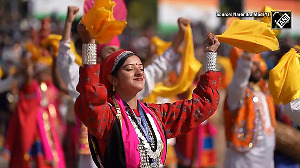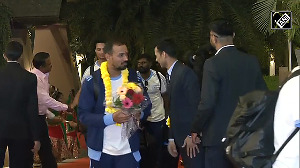The 2006 political declaration on HIV/AIDS in the United Nations General Assembly says that a quarter of a century into the epidemic, more than 65 million people have been infected with HIV, more than 25 million have died of AIDS, 15 million children have been orphaned, 40 million people are currently living with HIV, and millions more have been made vulnerable.
More than 95 per cent of them live in the developing countries.
The declaration further says 'we must overcome any legal, regulatory, trade and other barriers that block access to prevention, treatment, care and support; commit adequate resources; promote and protect all human rights and fundamental freedoms for all; promote gender equality and empowerment of women; do everything necessary to ensure access to life-saving drugs and prevention tools; and develop with equal urgency better tools -- drugs, diagnostics and prevention technologies, including vaccines and microbicides for the future.'
The Indian scenario
The first HIV/AIDS case was detected in India more than 20 years ago, but the disease remains a mystery to many even today. Stigma, discrimination and alienation of HIV-positive people still exist in Indian society.
Even in a 100 per cent literate state like Kerala, children with HIV/AIDS are prevented by parents of other children from studying in the same school.
In Meerut, Uttar Pradesh, doctors refused to help an HIV positive woman deliver her baby. She was also prevented from breastfeeding because the doctors felt she might pass on the virus to the baby. If this is the way doctors behave, how can we blame ordinary people who are less knowledgeable about the disease?
To educate every member of the society about the disease, INP+ -- the Indian Network for Positive People -- on July 9 launched an all-India campaign which will end on August 31, in Lucknow.
Fighters for a cause
It began a decade ago, when about 35 people living with HIV/AIDS attended a national workshop in Pune. Among the 35 was Ashok Pillai. After everyone underlined the critical need to have a platform for the AIDS-affected to raise and discuss the problems they face in society, Pillai came forward to run the organisation, and he was elected the general secretary.
The INP+ was formed with 12 people in February 1997. Three years later, there were more than 1,000 members from 14 states.
Today, 10 years later, the INP+ has a presence in 22 states and 126 districts, and has 82,000 members all over India.
After Pillai passed away in 2002, K K Abraham took over the reins of the organisation for some time.
R Elango has been the INP+ president since September 2006.
The organisation also has a network for women, the Positive Women's Network. The PWN+ is headed by Kausalya.
The next battle
"We want to disseminate all possible information about the disease and provide all the facilities available," Elango said about the nationwide campaign.
"We want people to pause and think why there is stigma and discrimination even after more than two decades (since the first case). People think that if you have HIV/AIDS, you will die immediately but we want people to understand that those with HIV/AIDS also can have quality life like any other normal person."
Because of the lack of information available, only 10 out of every 100 people afflicted with the disease get themselves tested.
"We want those 90 people also to come forward and get themselves tested. If everyone gets access to testing and treatment, if everyone in society is made aware of the disease, we can check the stigma and the discrimination and also control the epidemic," Elango said.
Another major reason behind the INP+ campaign is that though the UN wants to make ART (antiretrovial treatment) available to all persons with HIV/AIDS, many who are on ART have reached a stage where they are in need of the second-line treatment. As the second-line drugs are expensive, the Indian government has not started giving them out through health centres.
"Four per cent of those who are on ART are badly in need of the second-line drugs but the drugs are not available. Many people have even died because of the non-availability," Elango said.
The INP+ is in talks with the National AIDS Control Organisation to start giving the second-line drugs free of cost, as the government cannot deny treatment.
"Their target was making first-line drugs available to one lakh people. Nearly 80,000 people have now access to it but four per cent of them again need the next stage drugs," said Elango.
The INP+ plans to concentrate its campaign in high prevalence states -- like Manipur, Nagaland, Andhra Pradesh, Tamil Nadu, Maharashtra and Karnataka -- and also the states not covered so far like Bihar, Uttar Pradesh and Madhya Pradesh.
"Till three years ago, there were not many reports of HIV/AIDS cases from Bihar, UP, MP, etc, but that was not because there were not any," said Elango. "That was because there was no awareness and no testing. That is why we plan to end our campaign in Lucknow."
Elango also said there were no high-risk groups today.
"We have educated truck drivers and sex workers and now the disease has spread to the middle class and upper classes of the society."
The Tamil Nadu success
One of the states that have successfully spread HIV/AIDS awareness is Tamil Nadu.
"Access to care, support and treatment is a must. Tamil Nadu will move closer towards what the UN wants: universal access to treatment," said Supriya Sahu, project director of the Tamil Nadu AIDS Control Society, kickstarting the INP+ campaign.
In the last six months, the number of people on ART in Tamil Nadu has nearly tripled from 7,000 to 20,000, and 40,000 people have been registered for pre-ART services. The number of ART centres has gone up from 7 to 19, and the number of children on ART has increased from 400 to 1,100.
Tamil Nadu also has the highest number of integrated counselling and testing centres in the country: 730.
According to Sahu, access to ART has to be equitable. But accessibility is still a problem for many, though Tamil Nadu has the maximum number of people on ART. "Though the drug is given free of cost, we have to see that it reaches the needy, and it remains sustainable and lifelong too," Sahu said.
The scenario in high-prevalence north-eastern states like Manipur and Nagaland is different. Hence, the INP+ is planning a separate campaign in those regions, where it has to fight not only HIV/AIDS but also Hepatitis C.
Mountainous problem
Ajitshwor, a member of the Manipur unit of the INP+, has been on ART since 2004. When he first started the drug, he had to buy it, as free drugs were not available then. "Luckily for me, after three months, in April 2004, free ART drugs were given to us by the government," he said.
Though Manipur is a high-prevalence state, Ajitshwor added, the geography of the state makes it impossible to disseminate information. "75 per cent of the state is hilly. So, even to reach such villages is a task."
Similarly, although ART is available, people find it difficult and expensive to travel to get the drugs. "We also have blockades and bandhs happening all the time," he added.
Another major problem those affected with HIV/AIDS face in Manipur is Hepatitis C. "In Imphal, 92 per cent of those with HIV/AIDS have Hepatitis C also. So, just taking ART won't help the patients," Ajitshwor said.
When he first tested positive, Ajitshwor thought he would die soon. Later in 2004 when his CD-4 count went down 91, his doctor told him, 'There is no hope for you, still you can start ART.'
"But now I know that I will not die of AIDS," Ajitshwor said. "What is going to kill me is Hepatitis C. Hepatitis C is the killer in Manipur because most of the HIV/AIDS patients are or were drug users. It is transmitted through sharing of needles.
"We plan to go to every district so that information, care, support and ART are accessible to all," Ajitshwor continued. "In the cities, awareness is high but in the rural areas it is not high, so there is stigma and discrimination."
Nagaland too faces similar problems, according to Chongtie, who works as an education officer in the state.
"It is very difficult to get access to information, care and ART in Nagaland. There are only three ART centres in Nagaland. If I have to go to Kohima from a village to get the drug, it will take a day's travel. So, we have been asking for more ART centres. More than 4,000 people need ART but from our centre itself, only 360-odd people get access to ART," Chongte said.
Stigma and discrimination are also very high in a small state like Nagaland.
"Even among the educated, there is not enough awareness. We ourselves felt it. We had invited doctors to one of our seminars. The way they spoke about the target group, they made us feel that all of us were sex workers and that was how we got the disease. I worked as a nurse in a hospital and there was not a single sex worker among us. But they stigmatised us as sex workers. That is the kind of awareness we have in Nagaland."
Chongtie, like everyone at INP+ feels the new campaign will change the way not only people living with HIV/AIDS, but the way Indian society looks at the disease and its victims.






 © 2025
© 2025